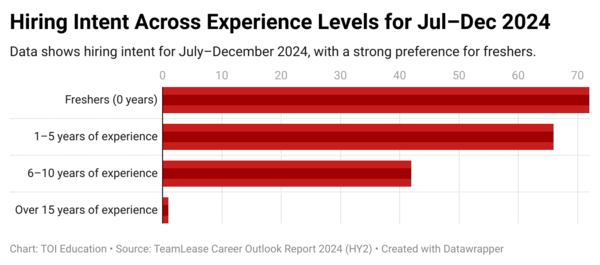Which Indian cities are more keen to hire freshers? A deep dive into employer intent, industry insights and more
In an increasingly competitive job market, the demand for fresh talent is on the rise. A striking 72% of employers have expressed their intent to hire freshers in the second half of 2024 according to the Career Outlook Report 2024 released by TeamLease. This signals a shift towards embracing nascent talent over seasoned professionals. This figure, up by 4% from the first half of this year, underlines a steady rise in opportunities for those just stepping into the workforce. The surge comes as industries such as e-commerce, engineering, and retail race to fill roles that require both foundational knowledge and adaptability to dynamic environments. Simultaneously, certain Indian cities are leading the charge in freshers recruitment, actively driving hiring trends and shaping employment landscapes across sectors.
But what’s truly fueling this appetite for fresh talent? It’s a confluence of industry demand, evolving education paradigms, and the drive to bridge critical skill gaps, all elements painting a promising picture for young professionals across the country. Read on to know more.
Hiring fresh talent: Top industries and cities leading the charge
Unsurprisingly, tech-driven industries like e-commerce and technology start-ups are leading the push, with 61% of employers in the sector signaling an intent to hire freshers in the current period.
Close behind are engineering and infrastructure (59%) and retail (54%). These industries, each grappling with rapid technological advancements and evolving consumer demands, benefit from fresh talent to drive innovation and productivity.
Industries and their Hiring Intent for Freshers (Source: TeamLease Career Outlook Report 2024)
Geographically, Bangalore emerges as the hotspot for fresher hiring, with 74% of employers in the city showing interest in bringing in new talent. Mumbai follows at 60%, while Chennai secures the third spot at 54%. These cities serve as major hubs for both traditional and emerging industries, offering roles that range from project engineering to digital sales.
Geographical Distribution of Fresher Hiring Intent (Source: TeamLease Career Outlook Report 2024)
Why freshers are the top choices of employers
The surge in fresher hiring isn’t just about filling gaps, it’s about building the workforce of the future. Employers see freshers as blank slates, capable of being trained to meet specific organisational needs while offering fresh perspectives.
Furthermore, with hiring sentiment growing across the board, from e-commerce to consulting, the demand for skilled, adaptable, and innovative fresh talent will likely continue its upward trajectory. The takeaway for aspiring professionals is, to invest in skill-building, additionally for institutions targeted education will be crucial in capitalising on this wave of opportunities.
Roles and skills freshers should focus on to improve employability
Across sectors, certain roles have seen a sharp uptick in demand, particularly those tied to the digital economy. Positions like full-stack developers, SEO executives, and digital sales associates stand out. For instance, Bangalore exhibits a strong demand for digital sales associates (71%), while Mumbai focuses on project engineers (40%). Meanwhile, data engineers and quality assurance roles are seeing growth in cities like Pune.
Employers are keen on a blend of domain-specific expertise and soft skills. Technical competencies such as programming, cloud computing, and data analytics are among the most sought-after, while soft skills like communication, teamwork, and critical thinking are increasingly valued. Together, these skills enable freshers to thrive in dynamic, collaborative environments.
The rise in fresher hiring: A broader perspective of the job market
The overall intent to hire across all experience levels for July–December 2024 stands at a robust 81%, according to the TeamLease report. Within this, freshers hold a dominant share at 72%, compared to 66% for candidates with 1–5 years of experience.
Meanwhile, mid- to senior-level hiring trails are at significantly lower rates, 42% for those with 6–10 years of experience and a mere 1% for professionals with over 15 years. This sharp disparity reflects a growing preference for cost-effective, trainable talent ready to grow within organisations.

Additionally, corporate integration of modern curricula, focussed on experiential learning and alignment with industry needs, has made freshers job-ready faster than before. Certifications in fields like financial planning, graphic design, and data science, along with corporate-driven education models, are ensuring that graduates enter the job market equipped with the skills that matter most.







